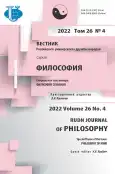The Role of Quantum Mechanics in Understanding the Phenomenon of Consciousness
- Authors: Cherepanov I.V.1
-
Affiliations:
- Novosibirsk State Technical University
- Issue: Vol 26, No 4 (2022): PHILOSOPHY OF MIND
- Pages: 770-789
- Section: PHILOSOPHY OF MIND
- URL: https://journal-vniispk.ru/2313-2302/article/view/325292
- DOI: https://doi.org/10.22363/2313-2302-2022-26-4-770-789
- ID: 325292
Cite item
Full Text
Abstract
The article analyzes the effectiveness of quantum theories of mental experience in relation to two ontological problems - the problem of the existence of consciousness in the material world and the problem of the interaction of consciousness and body. A critical analysis of the quantum theories of consciousness by Penrose-Hameroff, M. Tegmark, G. Stapp, M. Fischer and M.B. Mensky shows that they fail to fully explain how complex physical systems generate mental experience without violating the principle of causal closure of the physical world and the principle of epistemological completeness of physics. Quantum mechanics provides specific processes that are the physical basis of the psyche, but do not explain the phenomenal aspect of subjective reality. Nevertheless, the Heisenberg uncertainty principle gives an understanding of how the interaction of consciousness and body within the scientific picture of the world can be carried out without violating the law of energy conservation. It is shown that the quantum theories of consciousness currently being developed have a predominantly panprotopsychic character, which faces a problem due to the fact that the protomental property of physical systems must be expressed quantitatively and correspond to the value included in the physical equations. As a result, it is concluded that in order to develop quantum theories of consciousness more effectively, it is necessary to give an emergent character, not jumping from the quantum level to the psychic, but explaining the mechanism of the emergence of systemic properties during the sequential transition between different ontological regions of existence, including physical, chemical, biological, neurophysiological and psychic.
About the authors
Igor V. Cherepanov
Novosibirsk State Technical University
Author for correspondence.
Email: gradeco@yandex.ru
ORCID iD: 0000-0002-8683-0835
Candidate of Philosophy, Associate Professor, Associate Professor of the Department of Philosophy
20, K. Marksa street, Novosibirsk, 630073, Russian FederationReferences
- Velmans M. How to distinguish conceptual moments from empirical ones in the study of consciousness. Metodologiya i istoriya psikhologii. 2009;4(3):42—54. (In Russian).
- Smith Q. Why Cognitive Scientists Cannot Ignore Quantum Mechanics? Consciousness: New Philosophical Perspectives. Oxford: Oxford University Press; 2003. Р. 409—447.
- Penrose R, Shimoni A, Cartwright N, Hawking S. The Large, the Small and the Human Mind. Saint Petersburg: Amfora; 2008. (In Russian)
- Tegmark M. Importance of quantum decoherence in brain processes. Physical Review E. 2000;(61):4194—4206.
- Koch C, Hepp К. Quantum Mechanics in the Brain. Nature. 2006;(440):611—612.
- Jedlika P. Revisiting the Quantum Brain Hypothesis: Toward Quantum (Neuro)Biology? Frontiers in Molecular Neuroscience. 2017;(7):366—374.
- Maeda K, Henbest K, Cintolesi F, Kuprov I, Rodgers C, Liddell P, Gust D, Timmel C, Hore P. Chemical Compass Model of Avian Magnetoreception. Nature. 2008;(453):387—390.
- Cai J, Plenio M. Chemical Compass Model for Avian Magnetoreception as a Quantum Coherent Device. Physical Review Letters. 2013;111(23):230503. https://doi.org/10.1103/physrevlett.111.230503
- Hameroff S, Penrose R. Consciousness in the Universe: A Review of the «Orch OR» Theory. Biophysics of Consciousness: A Foundational Approach. Singapore: World Scientific; 2016. P. 517—630.
- Dubrovsky DI. Critical analysis of Penrose-Hameroff Theory of consciousness. Part 2. Filosofiya nauki i tekhniki. 2017;22(2):89—102. (In Russian).
- Tegmark M. Consciousness as a State of Matter. Chaos, Solitons & Fractals. 2015;(76):238—270.
- Tononi G, Boly M, Massimini M, Koch C. Integrated Information Theory: from Consciousness to its Physical Substrate. Nature Reviews Neuroscience. 2017;(17):450—461.
- Fisher M. Quantum Cognition: The Possibility of Processing with Nuclear Spins in the Brain. Annals of Physics. 2015;(362):593—602.
- Mensky MB. The concept of consciousness in the context of quantum mechanics. Uspekhi fizicheskikh nauk. 2005;(4):413—435. (In Russian).
- Mensky MB. Quantum mechanics, consciousness and the bridge between two cultures]. Voprosy filosofii. 2004;(6):64—74. (In Russian).
- Landau LD, Lifshits EM. Course of theoretical physics. Volume 3. Quantum Mechanics (non-relativistic theory). Moscow: FIZMATLIT; 2004.
- Chalmers D, McQueen K. Consciousness and the collapse of the wave function. Toward a Science of Consciousness 2015. University of Helsinki, Finland, 9—13 June 2015. http://consc.net/slides/collapse.pdf (accessed on 12.04.2022).
- Stapp H. Quantum Interactive Dualism: an Alternative to Materialism. Journal of Consciousness Studies. 2005;12(11):74—97.
- Velmans M. Understanding Consciousness. New York: Random House; 2009.
- Mensky MB. Quantum mechanics, consciousness and free will. Filosofiya nauki. 2009;14(1):53—63. (In Russian).
- Vasil'ev VV. Consciousness and things. An essay on phenomenalistic ontology. Moscow: Knizhnyi dom «LIBROKOM»; 2014.
- Beck F, Eccles J. Quantum aspects of brain activity and the role of consciousness. Proceedings of the National Academy of Sciences of the USA. 1992;(89): 67—84.
- Grib АА. Quantum indeterminism and free will. Filosofiya nauki i tekhniki. 2009;14(1):5—24. (In Russian).
- Conway J, Kochen S. The Free Will Theorem. Foundations of Physics. 2006; (36):1441—1473.
- Honderich T. A Theory of Determinism. Oxford: Oxford University Press; 1988.
- Storozhuk AY. Is quantum mechanics needed to explain how the brain works? Filosofiya nauki. 2018;4(79):137—145. (In Russian).
- Mensky MB. Intuition and the quantum approach to the theory of consciousness. Voprosy filosofii. 2015;(4):48—57. (In Russian).
- Simanov AL, Spaskov AN. The quantum basis of consciousness, or the ontology of psychophysical quantum reality. Filosofiya nauki. 2020;1(84):128—135. (In Russian).
- Vinnik DV. Квантовые свойства в физической организации мозга: амплификация или нивелировка? Filosofiya nauki. 2020;1(84):96—118. (In Russian).
- Chalmers D. The conscious mind. In search of a theory of conscious experience. Moscow: URSS, Knizhnyi dom «LIBROKOM»; 2013. (In Russian).
- Vinnik DV. Quantum theories of consciousness: metaphysical speculations and concrete scientific content. Filosofiya nauki. 2018;3(78):114—133. (In Russian).
Supplementary files









